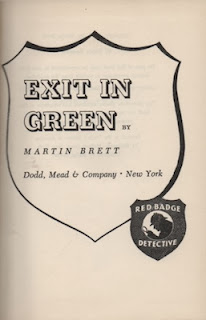Exit in Green
Martin Brett [pseud. Douglas Sanderson]
New York: Dodd, Mead, 1953
Douglas Sanderson once said that he turned to mysteries after
Dark Passions Subdue, his "serious" debut novel, had proven a commercial failure. I don't question the claim, but wonder whether
Exit in Green was such a great success.
Consider this:
Dark Passions Subdue was published in paperback, but not
Exit in Green; in fact, the latter is the only Sanderson novel – there are twenty-three – to have appeared only in hardcover. Dodd, Mead never returned to press, allowing the novel to go out of print. Six years passed before
Exit in Green appeared in the United Kingdom – and this was only after it had been rewritten for London publisher Hammond & Hammond.
I think
Exit in Green owes something to the author's early professional struggles. Sanderson's protagonist is William Marshall, a New York-based writer whose career hits the skids after he sells a play to a big-time Broadway director. Marshall is strung along for a bit, banking his future on rewrites until all goes bust. He then takes to drink, blacks out, and finds himself five days later in Boston having suffered a nervous breakdown.
The novel opens with the writer trying to right himself. He manages to get back in his agent's good books by proposing an article on reclusive English actress Leonora Kristen, who has taken up residence just outside the small Laurentian town of St Genebald. General consensus is that the country air will do him good.
Marshall may be in a fragile state, but he's a real pro. The afternoon following his arrival, he's got Leonora agreeing to a full-fledged biography. It's the writer's bad luck that the next morning the actress is found dead suspended from a pine tree:
Then slowly, painfully slowly, the clutched boughs parted and like some hideously overripe fruit, Leonora Kirsten disengaged from the tree and came plummeting to earth.
The grisly scene, hinted at in the Dodd Mead edition, is better captured by the Hammond & Hammond jacket:
Everyone but Marshall sees poor Leonora as the latest to take a tumble from
La Chauvre, a/k/a Bald Rock, a particularly treacherous part of a local hiking trail, The local landmark had claimed the lives of two other women in the previous two years. There was nothing suspicious about those deaths, nor is there anything odd in Leonora's, yet Marshall is convinced that the actress was murdered. He has no idea why or whodunit, but this doesn't stop him from making some pretty serious accusations about his innkeeper, Leonora's cook, the parish priest, a Montreal lawyer, Sergeant Rivard of the Sûreté du Québec and a good many others. Indeed, a fair percentage of sleepy little St Genebald (pop. 532) finds itself target of Marshall's unfounded aspersions, expressed loudly (often drunkenly) in the local hotel bar.
One suspects that the author – and here I mean Douglas Sanderson – is casting about, vainly attempting to find a murderer and motivation for Leonora's death. Eventually, well into the second half of the novel, he adds a Vancouver society woman to his cast of characters. This provides Douglas an out, though it does not help any reader who fancies him or herself a detective; the murderer and his true identity, upon which lies the solution, is revealed only in the final pages when he tries to kill again.
This reader had long lost interest in solving the murder of Leonora Kirsten. Truth be told, I was hoping that her death would be shown an accident, thus proving boorish lout William Marshall wrong.
No, I was more consumed by the mystery surrounding Marshall's unfounded allegations, and why it was that none of the townsfolk popped him in the puss. More than this, I wanted to know how such a sloppy, directionless novel – written, it needs be said, by a man who did not read mysteries – was published. Most of all, I must know how the hand that produced
Exit in Green gave us
Hot Freeze, the Great Canadian Noir Novel, not five months later.
Q: Might an explanation for St Genebald's small population lie in the number of women who lose their lives on
La Chauvre?
They really should consider a fence or something.
Trivia: As production problems with Marshall's play mount, the role of the leading lady shifts from Cordelia Otis Skinner to Gale Sondergaard to Judith Anderson. Sanderson botches the name of the first actress.
Object: Orange boards stamped with green foil. My copy was purchased a couple of months ago from an American bookseller. Price: US$9.99.
Access: Only the University of Toronto, the University of Alberta, Library and Archives Canada and the Toronto Public Library have copies. Not one Canadian library has
Murder Came Tumbling.
Two copies of
Exit in Green are listed for sale online. Recognition goes to the Missouri bookseller who offers a Very Good copy at US$14.50. Ridicule is placed upon the Illinois bookseller who claims his ex-library copy to be "Very Good-", then provides this description: "Moderate shelf cock, IDs on backstrip, mottled lower edge as from damp stains, paperwork at front, minor to moderate toning throughout". Clearly, a reading copy sold by a ne'er-do-well.
The lone copy of
Murder Came Tumbling is being offered at £47 by a bookseller in Lincolnshire. More than worth it.

























